Research Proposal on Diabetes Mellitus and Glycemic Control
VerifiedAdded on 2023/04/21
|10
|1148
|242
Report
AI Summary
This research proposal investigates the impact of self-monitoring of blood glucose (SMBG) on glycemic control in type 2 diabetes mellitus patients. The study aims to determine if SMBG significantly improves glycemic levels and compares results between patients who use SMBG and those who do not. The research will employ a secondary research methodology, including a literature review and the PICO framework to gather information from databases like BMJ Journals and Google Scholar. The proposal outlines the research question, objectives, methodology, and practical considerations, including cost and potential challenges. It emphasizes the importance of SMBG in managing blood sugar levels and preventing acute and chronic complications associated with diabetes. The proposal also highlights the need for further research and the potential benefits of SMBG for both patients and healthcare professionals in guiding self-management strategies.
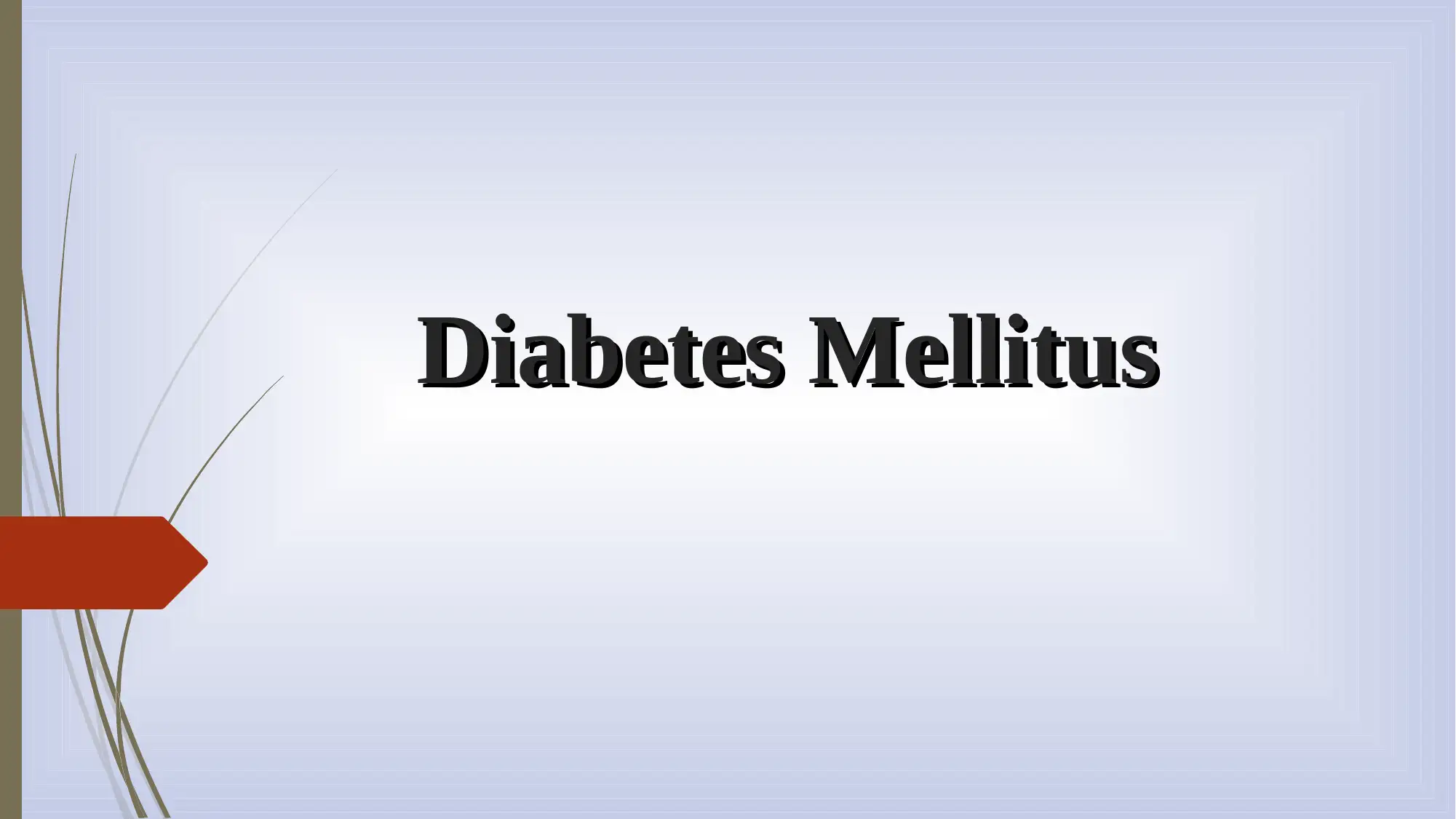
Diabetes MellitusDiabetes Mellitus
Paraphrase This Document
Need a fresh take? Get an instant paraphrase of this document with our AI Paraphraser
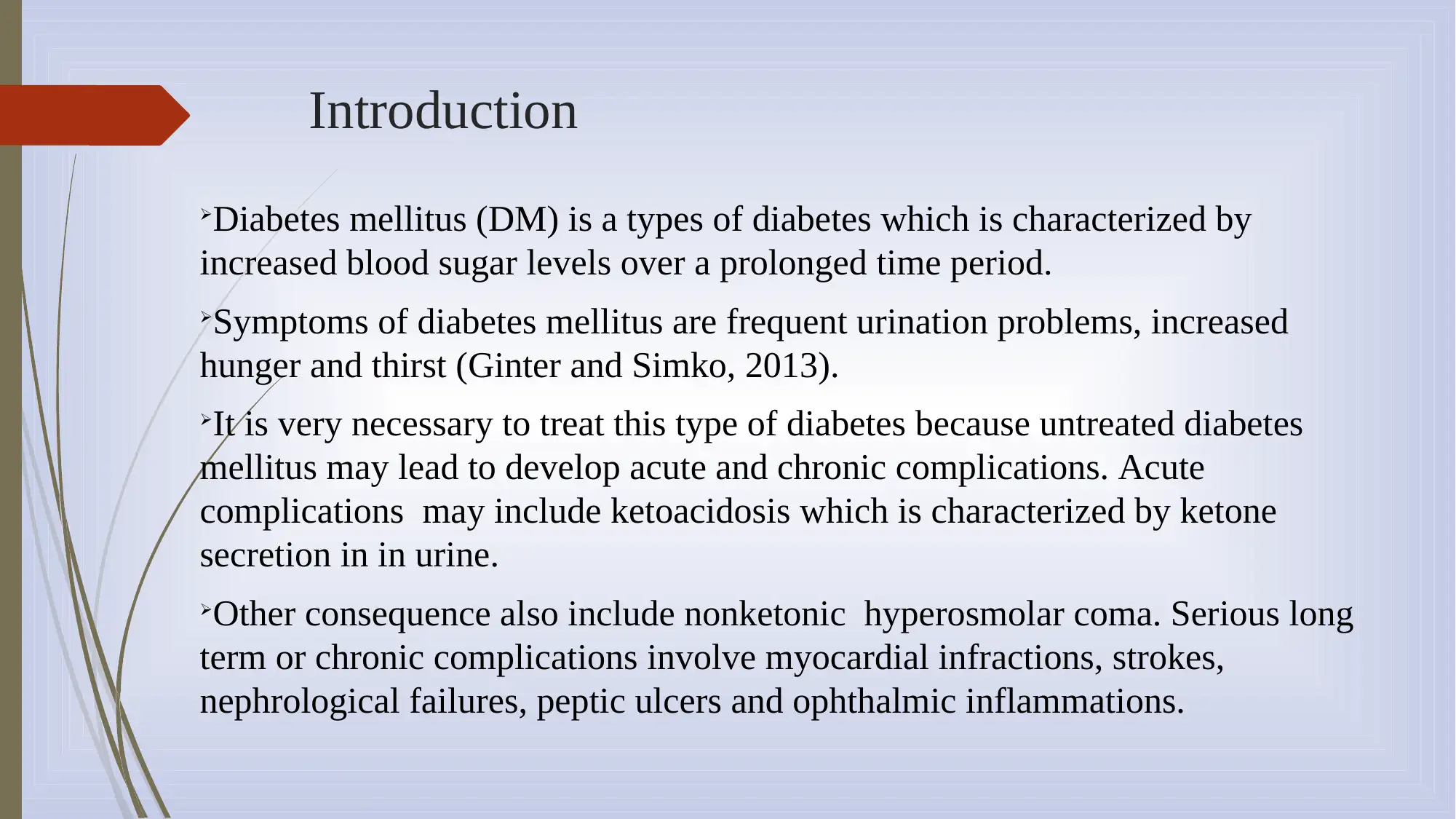
Introduction
Diabetes mellitus (DM) is a types of diabetes which is characterized by
increased blood sugar levels over a prolonged time period.
Symptoms of diabetes mellitus are frequent urination problems, increased
hunger and thirst (Ginter and Simko, 2013).
It is very necessary to treat this type of diabetes because untreated diabetes
mellitus may lead to develop acute and chronic complications. Acute
complications may include ketoacidosis which is characterized by ketone
secretion in in urine.
Other consequence also include nonketonic hyperosmolar coma. Serious long
term or chronic complications involve myocardial infractions, strokes,
nephrological failures, peptic ulcers and ophthalmic inflammations.
Diabetes mellitus (DM) is a types of diabetes which is characterized by
increased blood sugar levels over a prolonged time period.
Symptoms of diabetes mellitus are frequent urination problems, increased
hunger and thirst (Ginter and Simko, 2013).
It is very necessary to treat this type of diabetes because untreated diabetes
mellitus may lead to develop acute and chronic complications. Acute
complications may include ketoacidosis which is characterized by ketone
secretion in in urine.
Other consequence also include nonketonic hyperosmolar coma. Serious long
term or chronic complications involve myocardial infractions, strokes,
nephrological failures, peptic ulcers and ophthalmic inflammations.
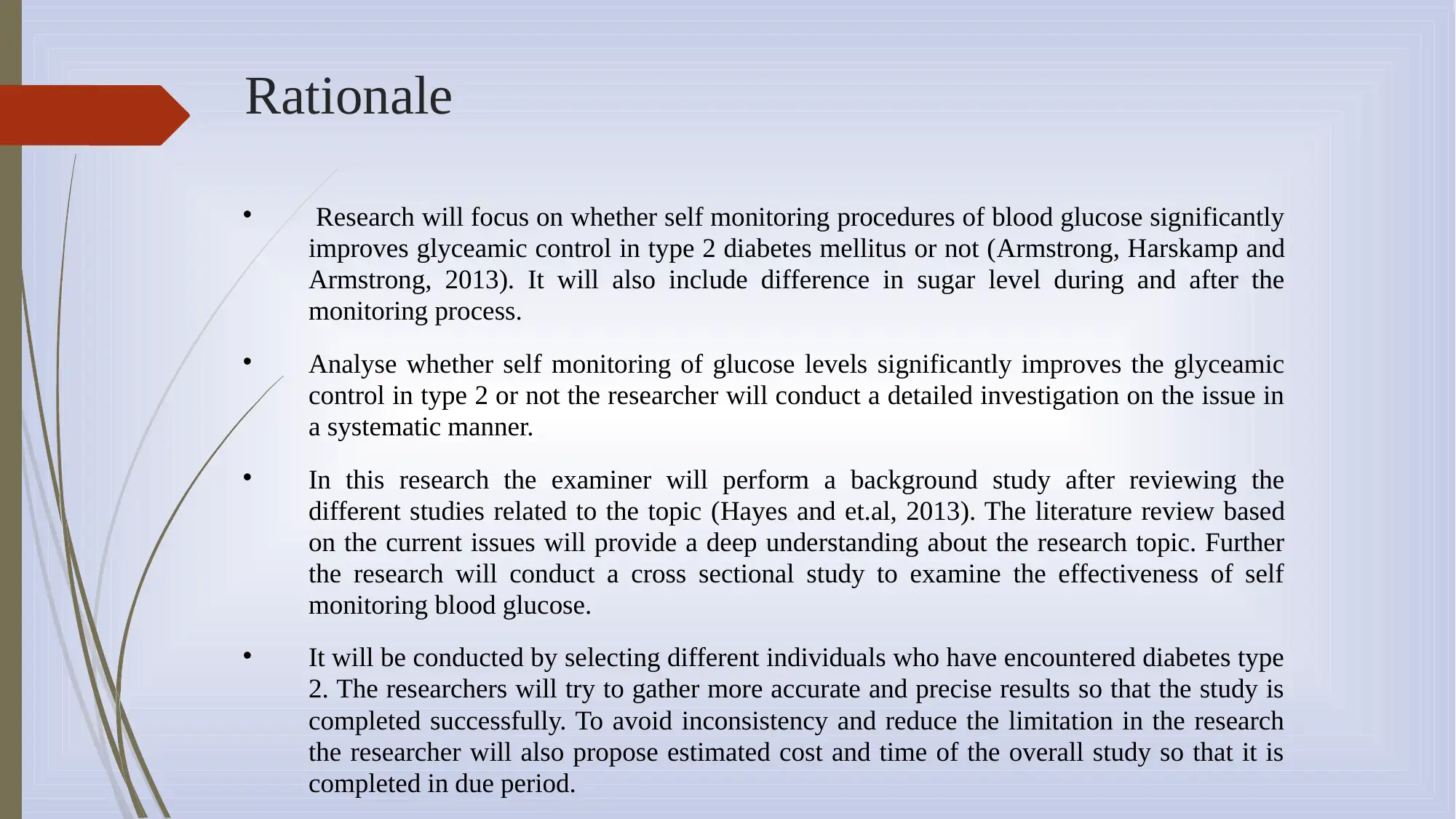
Rationale
Research will focus on whether self monitoring procedures of blood glucose significantly
improves glyceamic control in type 2 diabetes mellitus or not (Armstrong, Harskamp and
Armstrong, 2013). It will also include difference in sugar level during and after the
monitoring process.
Analyse whether self monitoring of glucose levels significantly improves the glyceamic
control in type 2 or not the researcher will conduct a detailed investigation on the issue in
a systematic manner.
In this research the examiner will perform a background study after reviewing the
different studies related to the topic (Hayes and et.al, 2013). The literature review based
on the current issues will provide a deep understanding about the research topic. Further
the research will conduct a cross sectional study to examine the effectiveness of self
monitoring blood glucose.
It will be conducted by selecting different individuals who have encountered diabetes type
2. The researchers will try to gather more accurate and precise results so that the study is
completed successfully. To avoid inconsistency and reduce the limitation in the research
the researcher will also propose estimated cost and time of the overall study so that it is
completed in due period.
Research will focus on whether self monitoring procedures of blood glucose significantly
improves glyceamic control in type 2 diabetes mellitus or not (Armstrong, Harskamp and
Armstrong, 2013). It will also include difference in sugar level during and after the
monitoring process.
Analyse whether self monitoring of glucose levels significantly improves the glyceamic
control in type 2 or not the researcher will conduct a detailed investigation on the issue in
a systematic manner.
In this research the examiner will perform a background study after reviewing the
different studies related to the topic (Hayes and et.al, 2013). The literature review based
on the current issues will provide a deep understanding about the research topic. Further
the research will conduct a cross sectional study to examine the effectiveness of self
monitoring blood glucose.
It will be conducted by selecting different individuals who have encountered diabetes type
2. The researchers will try to gather more accurate and precise results so that the study is
completed successfully. To avoid inconsistency and reduce the limitation in the research
the researcher will also propose estimated cost and time of the overall study so that it is
completed in due period.
⊘ This is a preview!⊘
Do you want full access?
Subscribe today to unlock all pages.

Trusted by 1+ million students worldwide
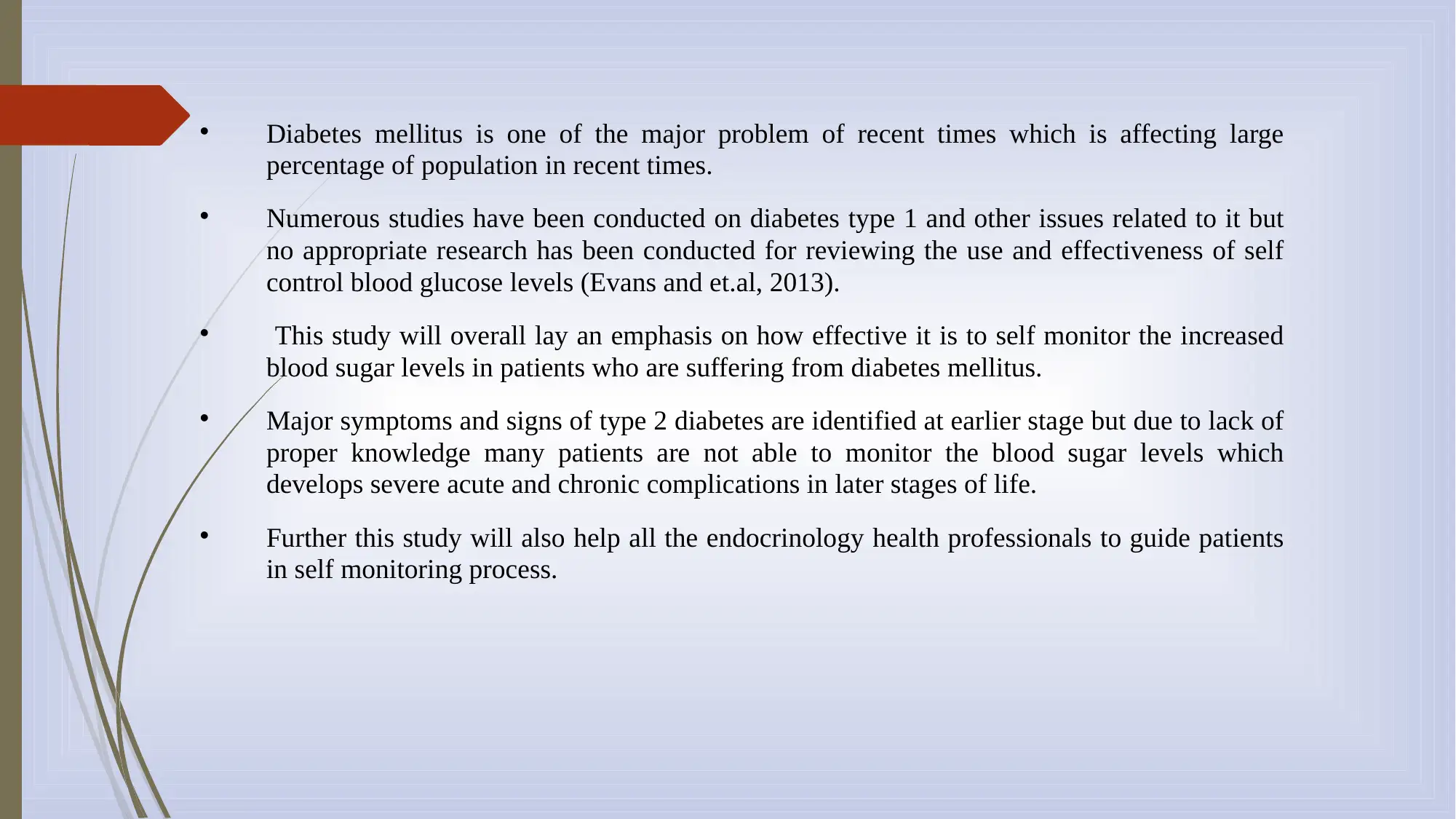
Diabetes mellitus is one of the major problem of recent times which is affecting large
percentage of population in recent times.
Numerous studies have been conducted on diabetes type 1 and other issues related to it but
no appropriate research has been conducted for reviewing the use and effectiveness of self
control blood glucose levels (Evans and et.al, 2013).
This study will overall lay an emphasis on how effective it is to self monitor the increased
blood sugar levels in patients who are suffering from diabetes mellitus.
Major symptoms and signs of type 2 diabetes are identified at earlier stage but due to lack of
proper knowledge many patients are not able to monitor the blood sugar levels which
develops severe acute and chronic complications in later stages of life.
Further this study will also help all the endocrinology health professionals to guide patients
in self monitoring process.
percentage of population in recent times.
Numerous studies have been conducted on diabetes type 1 and other issues related to it but
no appropriate research has been conducted for reviewing the use and effectiveness of self
control blood glucose levels (Evans and et.al, 2013).
This study will overall lay an emphasis on how effective it is to self monitor the increased
blood sugar levels in patients who are suffering from diabetes mellitus.
Major symptoms and signs of type 2 diabetes are identified at earlier stage but due to lack of
proper knowledge many patients are not able to monitor the blood sugar levels which
develops severe acute and chronic complications in later stages of life.
Further this study will also help all the endocrinology health professionals to guide patients
in self monitoring process.
Paraphrase This Document
Need a fresh take? Get an instant paraphrase of this document with our AI Paraphraser
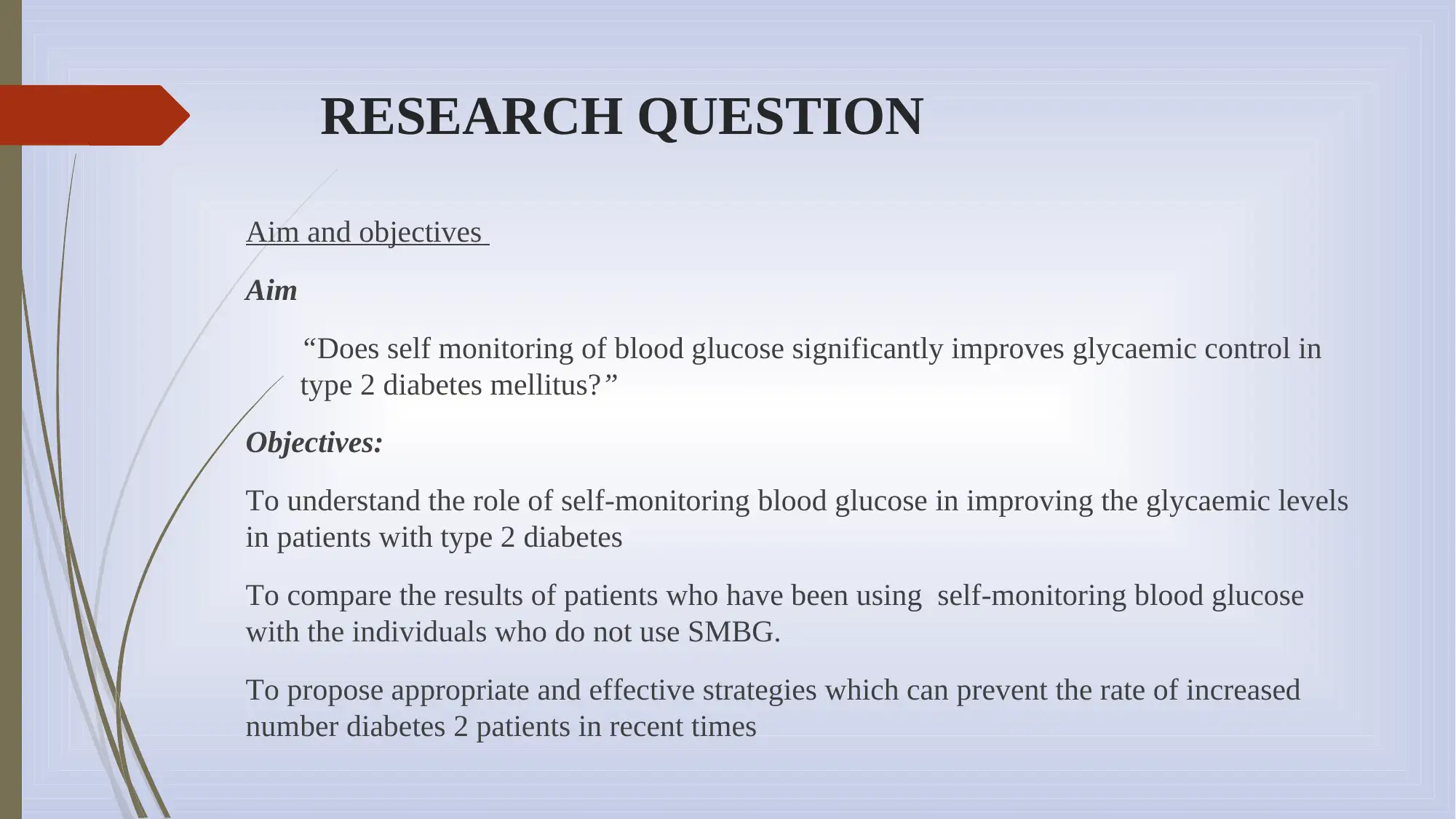
RESEARCH QUESTION
Aim and objectives
Aim
“Does self monitoring of blood glucose significantly improves glycaemic control in
type 2 diabetes mellitus?”
Objectives:
To understand the role of self-monitoring blood glucose in improving the glycaemic levels
in patients with type 2 diabetes
To compare the results of patients who have been using self-monitoring blood glucose
with the individuals who do not use SMBG.
To propose appropriate and effective strategies which can prevent the rate of increased
number diabetes 2 patients in recent times
Aim and objectives
Aim
“Does self monitoring of blood glucose significantly improves glycaemic control in
type 2 diabetes mellitus?”
Objectives:
To understand the role of self-monitoring blood glucose in improving the glycaemic levels
in patients with type 2 diabetes
To compare the results of patients who have been using self-monitoring blood glucose
with the individuals who do not use SMBG.
To propose appropriate and effective strategies which can prevent the rate of increased
number diabetes 2 patients in recent times
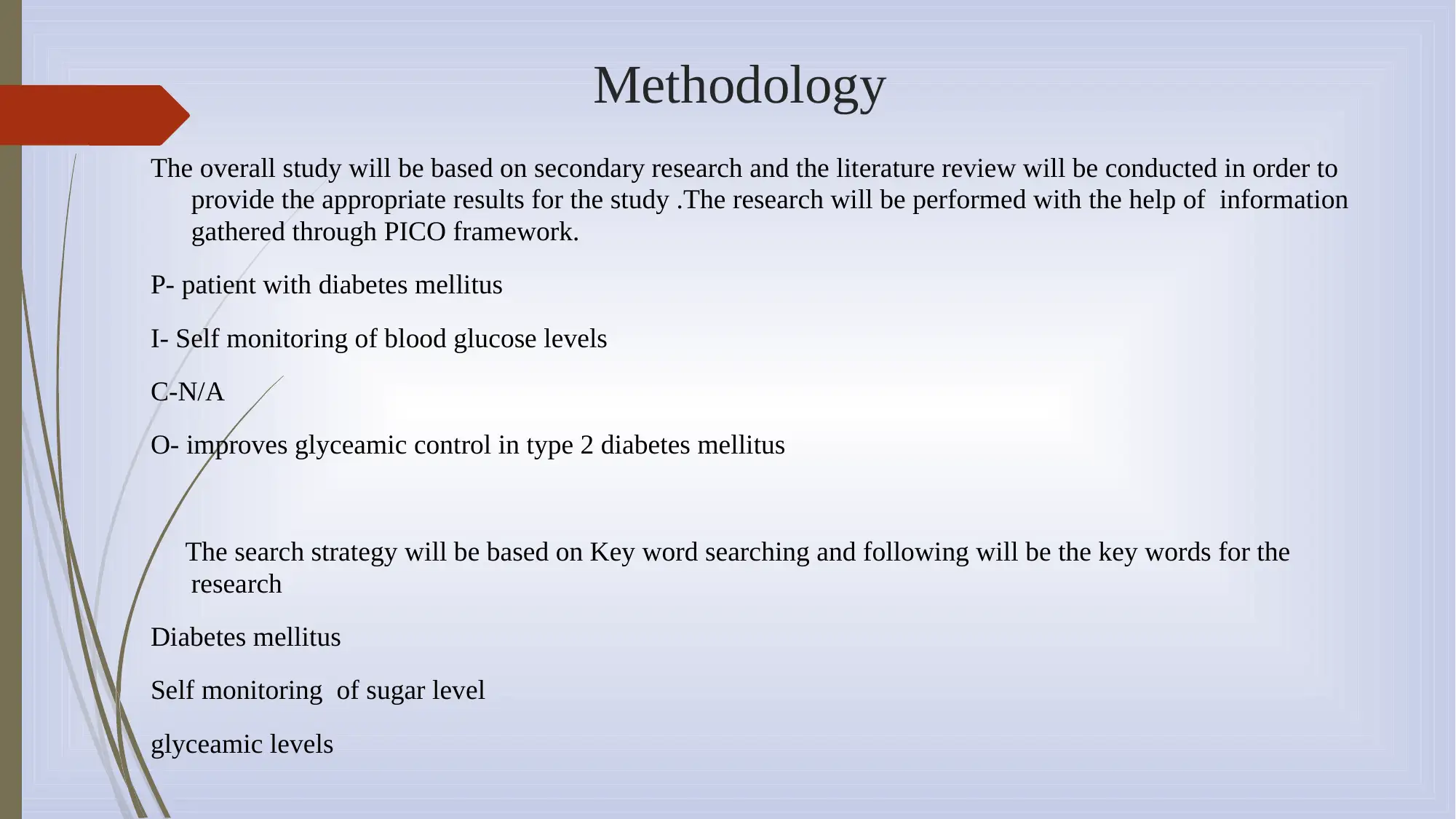
Methodology
The overall study will be based on secondary research and the literature review will be conducted in order to
provide the appropriate results for the study .The research will be performed with the help of information
gathered through PICO framework.
P- patient with diabetes mellitus
I- Self monitoring of blood glucose levels
C-N/A
O- improves glyceamic control in type 2 diabetes mellitus
The search strategy will be based on Key word searching and following will be the key words for the
research
Diabetes mellitus
Self monitoring of sugar level
glyceamic levels
The overall study will be based on secondary research and the literature review will be conducted in order to
provide the appropriate results for the study .The research will be performed with the help of information
gathered through PICO framework.
P- patient with diabetes mellitus
I- Self monitoring of blood glucose levels
C-N/A
O- improves glyceamic control in type 2 diabetes mellitus
The search strategy will be based on Key word searching and following will be the key words for the
research
Diabetes mellitus
Self monitoring of sugar level
glyceamic levels
⊘ This is a preview!⊘
Do you want full access?
Subscribe today to unlock all pages.

Trusted by 1+ million students worldwide
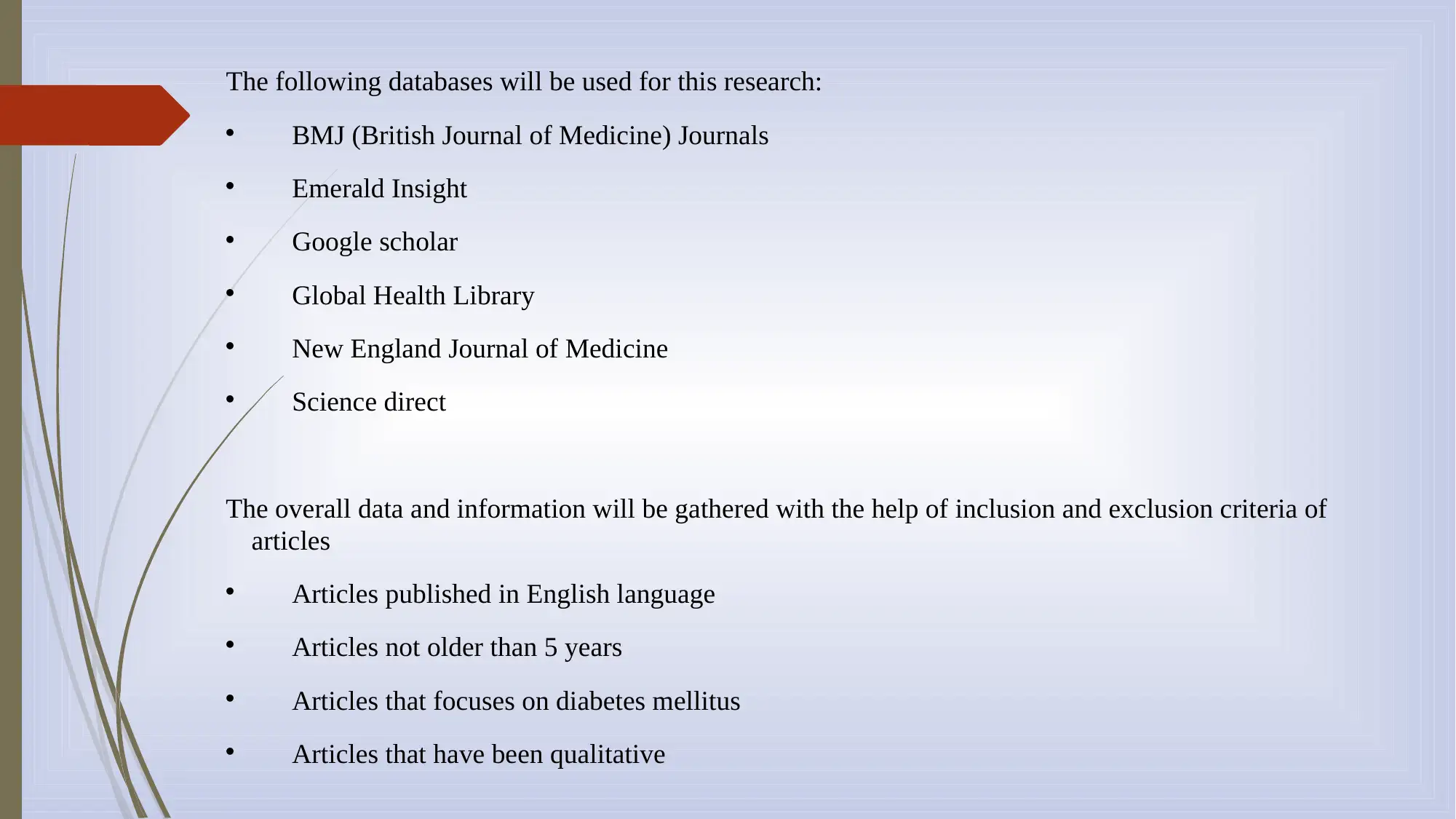
The following databases will be used for this research:
BMJ (British Journal of Medicine) Journals
Emerald Insight
Google scholar
Global Health Library
New England Journal of Medicine
Science direct
The overall data and information will be gathered with the help of inclusion and exclusion criteria of
articles
Articles published in English language
Articles not older than 5 years
Articles that focuses on diabetes mellitus
Articles that have been qualitative
BMJ (British Journal of Medicine) Journals
Emerald Insight
Google scholar
Global Health Library
New England Journal of Medicine
Science direct
The overall data and information will be gathered with the help of inclusion and exclusion criteria of
articles
Articles published in English language
Articles not older than 5 years
Articles that focuses on diabetes mellitus
Articles that have been qualitative
Paraphrase This Document
Need a fresh take? Get an instant paraphrase of this document with our AI Paraphraser
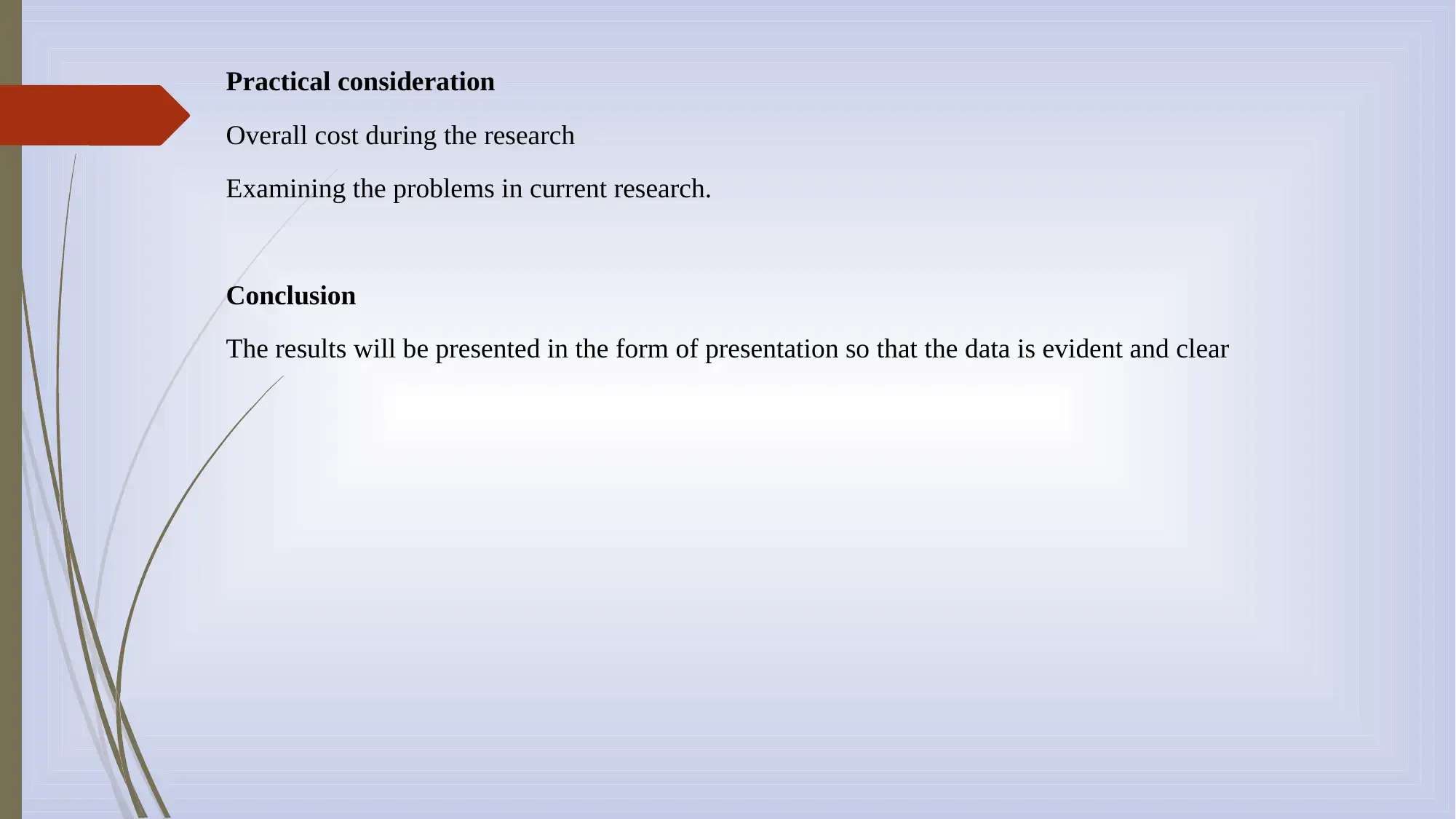
Practical consideration
Overall cost during the research
Examining the problems in current research.
Conclusion
The results will be presented in the form of presentation so that the data is evident and clear
Overall cost during the research
Examining the problems in current research.
Conclusion
The results will be presented in the form of presentation so that the data is evident and clear
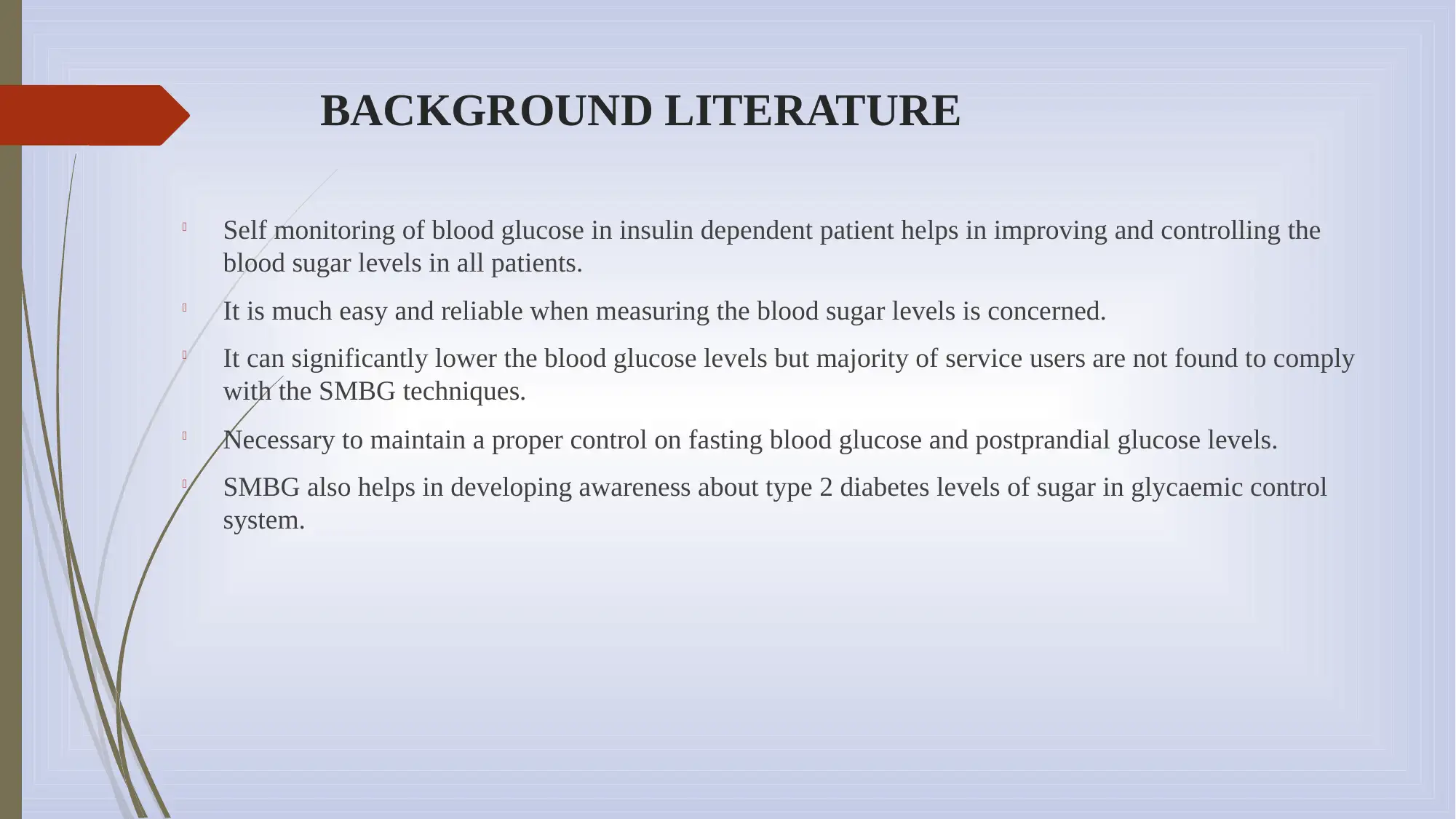
BACKGROUND LITERATURE
Self monitoring of blood glucose in insulin dependent patient helps in improving and controlling the
blood sugar levels in all patients.
It is much easy and reliable when measuring the blood sugar levels is concerned.
It can significantly lower the blood glucose levels but majority of service users are not found to comply
with the SMBG techniques.
Necessary to maintain a proper control on fasting blood glucose and postprandial glucose levels.
SMBG also helps in developing awareness about type 2 diabetes levels of sugar in glycaemic control
system.
Self monitoring of blood glucose in insulin dependent patient helps in improving and controlling the
blood sugar levels in all patients.
It is much easy and reliable when measuring the blood sugar levels is concerned.
It can significantly lower the blood glucose levels but majority of service users are not found to comply
with the SMBG techniques.
Necessary to maintain a proper control on fasting blood glucose and postprandial glucose levels.
SMBG also helps in developing awareness about type 2 diabetes levels of sugar in glycaemic control
system.
⊘ This is a preview!⊘
Do you want full access?
Subscribe today to unlock all pages.

Trusted by 1+ million students worldwide
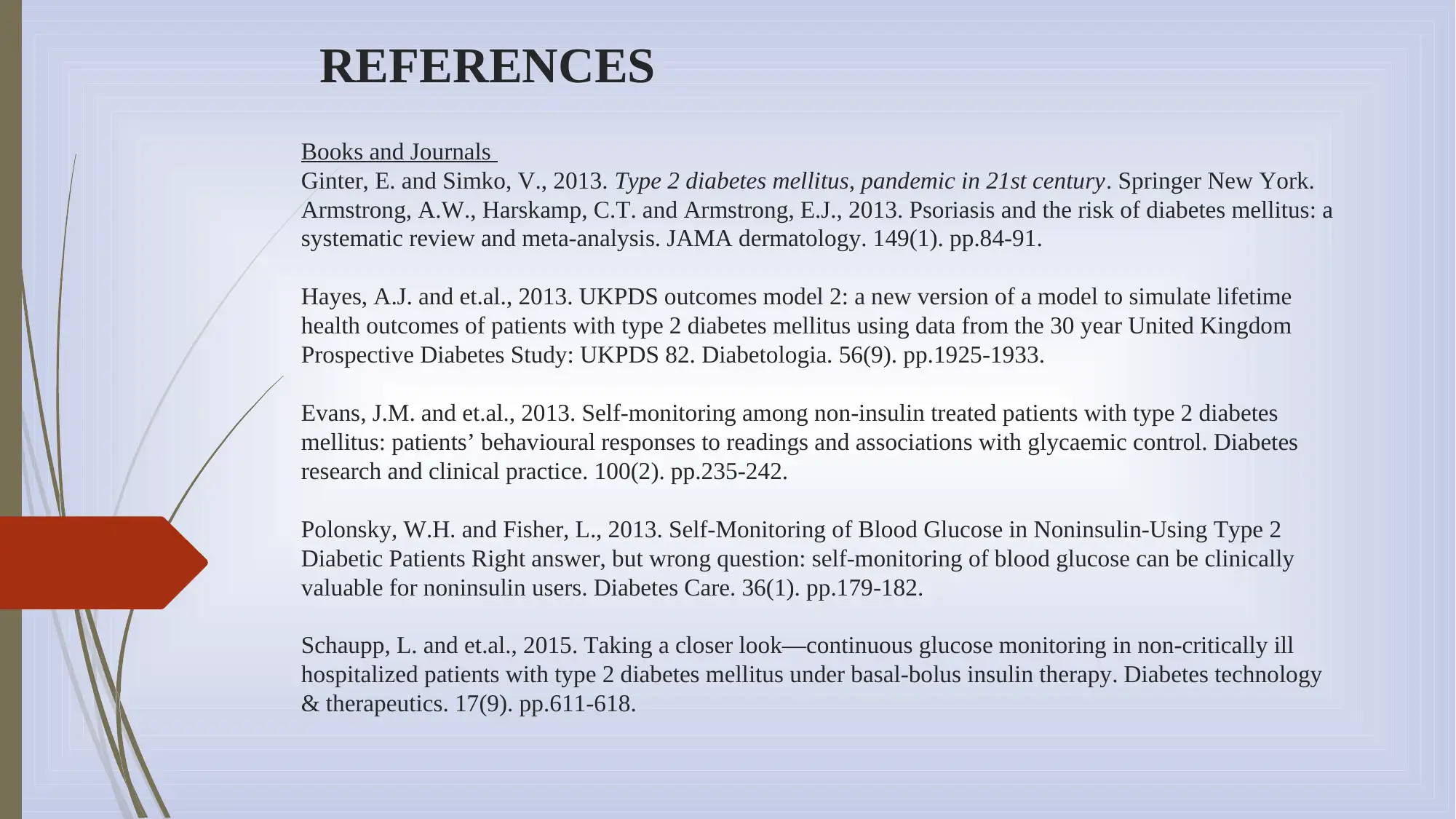
REFERENCES
Books and Journals
Ginter, E. and Simko, V., 2013. Type 2 diabetes mellitus, pandemic in 21st century. Springer New York.
Armstrong, A.W., Harskamp, C.T. and Armstrong, E.J., 2013. Psoriasis and the risk of diabetes mellitus: a
systematic review and meta-analysis. JAMA dermatology. 149(1). pp.84-91.
Hayes, A.J. and et.al., 2013. UKPDS outcomes model 2: a new version of a model to simulate lifetime
health outcomes of patients with type 2 diabetes mellitus using data from the 30 year United Kingdom
Prospective Diabetes Study: UKPDS 82. Diabetologia. 56(9). pp.1925-1933.
Evans, J.M. and et.al., 2013. Self-monitoring among non-insulin treated patients with type 2 diabetes
mellitus: patients’ behavioural responses to readings and associations with glycaemic control. Diabetes
research and clinical practice. 100(2). pp.235-242.
Polonsky, W.H. and Fisher, L., 2013. Self-Monitoring of Blood Glucose in Noninsulin-Using Type 2
Diabetic Patients Right answer, but wrong question: self-monitoring of blood glucose can be clinically
valuable for noninsulin users. Diabetes Care. 36(1). pp.179-182.
Schaupp, L. and et.al., 2015. Taking a closer look—continuous glucose monitoring in non-critically ill
hospitalized patients with type 2 diabetes mellitus under basal-bolus insulin therapy. Diabetes technology
& therapeutics. 17(9). pp.611-618.
Books and Journals
Ginter, E. and Simko, V., 2013. Type 2 diabetes mellitus, pandemic in 21st century. Springer New York.
Armstrong, A.W., Harskamp, C.T. and Armstrong, E.J., 2013. Psoriasis and the risk of diabetes mellitus: a
systematic review and meta-analysis. JAMA dermatology. 149(1). pp.84-91.
Hayes, A.J. and et.al., 2013. UKPDS outcomes model 2: a new version of a model to simulate lifetime
health outcomes of patients with type 2 diabetes mellitus using data from the 30 year United Kingdom
Prospective Diabetes Study: UKPDS 82. Diabetologia. 56(9). pp.1925-1933.
Evans, J.M. and et.al., 2013. Self-monitoring among non-insulin treated patients with type 2 diabetes
mellitus: patients’ behavioural responses to readings and associations with glycaemic control. Diabetes
research and clinical practice. 100(2). pp.235-242.
Polonsky, W.H. and Fisher, L., 2013. Self-Monitoring of Blood Glucose in Noninsulin-Using Type 2
Diabetic Patients Right answer, but wrong question: self-monitoring of blood glucose can be clinically
valuable for noninsulin users. Diabetes Care. 36(1). pp.179-182.
Schaupp, L. and et.al., 2015. Taking a closer look—continuous glucose monitoring in non-critically ill
hospitalized patients with type 2 diabetes mellitus under basal-bolus insulin therapy. Diabetes technology
& therapeutics. 17(9). pp.611-618.
1 out of 10
Related Documents
Your All-in-One AI-Powered Toolkit for Academic Success.
+13062052269
info@desklib.com
Available 24*7 on WhatsApp / Email
![[object Object]](/_next/static/media/star-bottom.7253800d.svg)
Unlock your academic potential
Copyright © 2020–2025 A2Z Services. All Rights Reserved. Developed and managed by ZUCOL.





